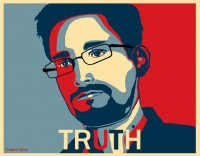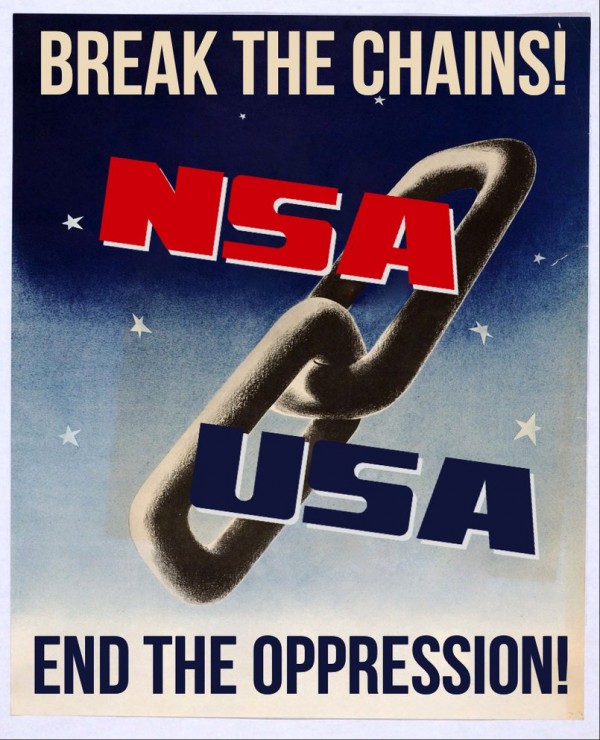Artwork by POASTERCHILD
ELECTRONIC FRONTIER FOUNDATION: In a historic decision, a federal judge in Washington, D.C. today declared that the NSA’s mass phone records surveillance is likely unconstitutional, ruling that the plaintiff’s data should be purged from the system and prohibiting the NSA from collecting further phone records from the plaintiffs. The case, Klayman v. Obama, undermines the government’s assertions that its bulk surveillance program, which collects virtually every phone record in the United States, is legal. MORE
U.S. DISTRICT COURT JUDGE RICHARD LEON: “I believe that bulk telephony metadata collection and analysis almost certainly does violate a reasonable expectation of privacy. […] I have serious doubts about the efficacy of the metadata collection program as a means of conducting time-sensitive investigations in cases involving imminent threats of terrorism. […] When do present-day circumstances — the evolutions in the government’s surveillance capabilities, citizens’ phone habits, and the relationship between the NSA and telecom companies — become so thoroughly unlike those considered by the Supreme Court 34 years ago that a precedent like Smith v Maryland simply does not a apply? The answer, unfortunately for the government, is now. […] The almost-Orwellian technology that enables the government to store and analyze the phone metadata of every telephone user in the United States is unlike anything that could have been conceived of in 1979. […] I cannot imagine a more ‘indiscriminate’ and ‘arbitrary invasion’ than this systemic and high-tech collection and retention of personal data on virtually every single citizen for the purposes of querying and analyzing it without prior judicial approval. Surely, such a program infringes on ‘that degree of privacy’ that the founders enshrined in the Fourth Amendment. Indeed, I have little doubt that the author of our Constitution, James Madison, who cautioned us to beware ‘the abridgment of freedom of the people by gradual and silent encroachments by those in power,’ would be aghast. […] There is the very real prospect that the (NSA) program will go on for as long as America is combating terrorism, which realistically could be forever!” MORE
RELATED: Edward Snowden’s Open Letter To Brazil
FORBES: “That kid was a genius among geniuses,” says the NSA staffer. “NSA is full of smart people, but anybody who sat in a meeting with Ed will tell you he was in a class of his own…I’ve never seen anything like it.” When I reached out to the NSA’s public affairs office, a spokesperson declined to comment, citing the agency’s ongoing investigation into Snowden’s leaks. But over the course of my communications with the NSA staffer, Snowden’s former colleague offered details that shed light on both how Snowden was able to obtain the NSA’s most secret files, as well as the elusive 30-year old’s character:
- Before coming to NSA Hawaii, Snowden had impressed NSA officials by developing a backup system that the NSA had widely implemented in its codebreaking operations.
- He also frequently reported security vulnerabilities in NSA software. Many of the bugs were never patched.
- Snowden had been brought to Hawaii as a cybersecurity expert working for Dell’s services division but due to a problem with the contract was reassigned to become an administrator for the Microsoft intranet management system known as Sharepoint. Impressed with his technical abilities, Snowden’s managers decided that he was the most qualified candidate to build a new web front-end for one of its projects, despite his contractor status. As his coworker tells it, he was given full administrator privileges, with virtually unlimited access to NSA data. “Big mistake in hindsight,” says Snowden’s former colleague. “But if you had a guy who could do things nobody else could, and the only problem was that his badge was green instead of blue, what would you do?”

- As further evidence that Snowden didn’t hijack his colleagues’ accounts for his leak, the NSA staffer points to an occasion when Snowden was given a manager’s password so that he could cover for him while he was on vacation. Even then, investigators found no evidence Snowden had misused that staffer’s privileges, and the source says nothing he could have uniquely accessed from the account has shown up in news reports.
- Snowden’s superiors were so impressed with his skills that he was at one point offered a position on the elite team of NSA hackers known as Tailored Access Operations. He unexpectedly turned it down and instead joined Booz Allen to work at NSA’s Threat Operation Center.
- Another hint of his whistleblower conscience, aside from the telltale hoodie: Snowden kept a copy of the constitution on his desk to cite when arguing against NSA activities he thought might violate it.
- The source tells me Snowden also once nearly lost his job standing up for a coworker who was being disciplined by a superior.
- Snowden often left small, gifts anonymously at colleagues’ desks.
- He frequently walked NSA’s halls carrying a Rubik’s cube–the same object he held to identify himself on a Hong Kong street to the journalists who first met with him to publish his leaks.
- Snowden’s former colleague says that he or she has slowly come to understand Snowden’s decision to leak the NSA’s files. “I was shocked and betrayed when I first learned the news, but as more time passes I’m inclined to believe he really is trying to do the right thing and it’s not out of character for him. I don’t agree with his methods, but I understand why he did it,” he or she says. “I won’t call him a hero, but he’s sure as hell no traitor.” MORE

